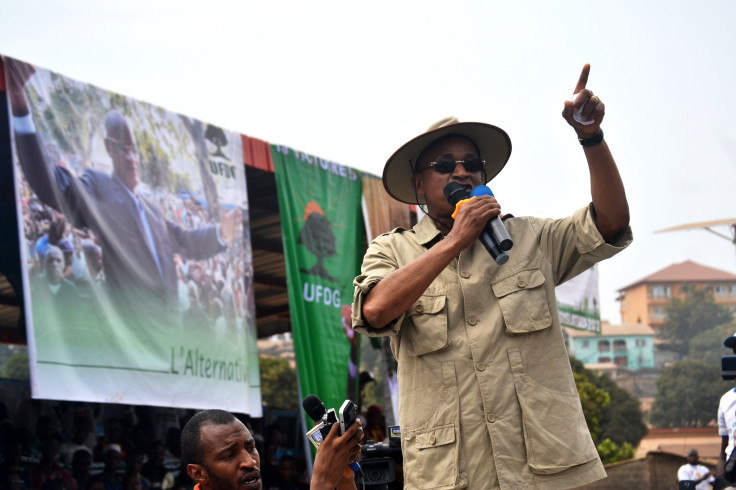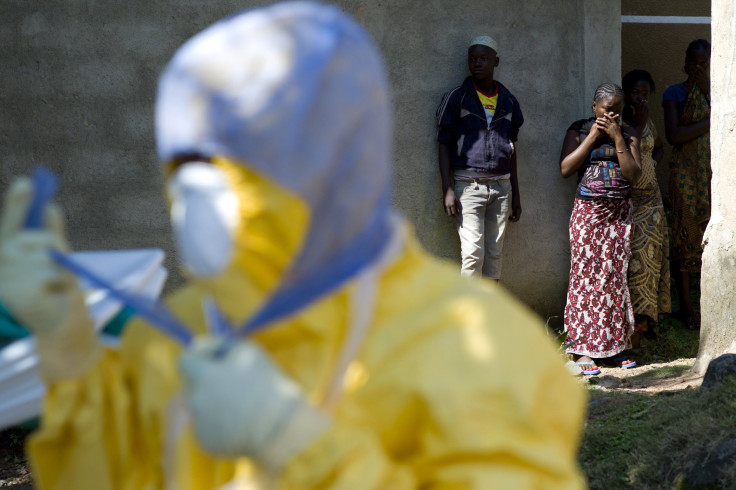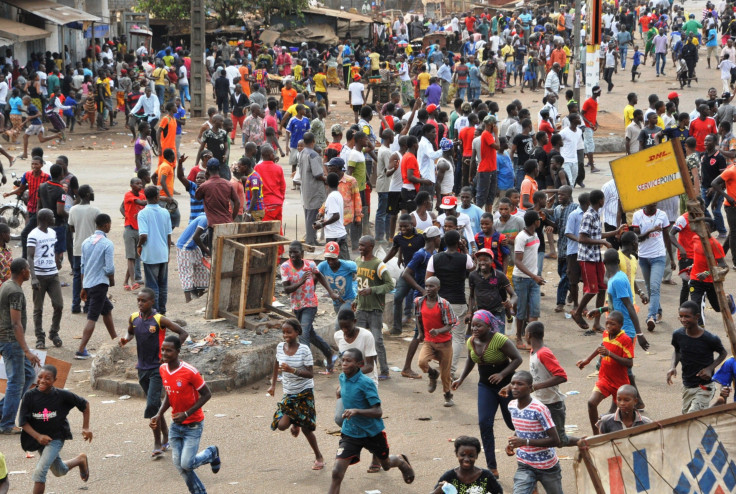Guinea Election 2015: Guide To Presidential Candidates, Key Issues, Voting Process, Voter Security And When To Expect Results

Guinea’s presidential election is set to take place Sunday despite calls by the political opposition to delay it until later this month to fix irregularities in the process. The planned vote has reopened fault lines between the West African country’s two largest ethnic groups and pitted backers of incumbent President Alpha Conde against supporters of his main challenger, Cellou Dalein Diallo. Whoever wins could face violent riots and must take on a slew of other issues, including those associated with an Ebola virus disease epidemic, falling commodity prices and a slumping economy. Below is our guide to what you need to know before the presidential election.
The Candidates
Guinea’s current president is seeking re-election. Conde, 77, is a Marxist intellectual and a member of the Rally of the Guinean People party who spent years in exile as a political dissident. He unsuccessfully ran for president in 1993 and 1998.
Conde, who was born in Boke in the Lower Guinea region, beat Diallo in the 2010 presidential election. The disputed election concluded two years of brutal military rule. The incumbent is favored to win a second term Sunday. He hails from the Malinke ethnic group, Guinea’s second-largest, accounting for 30 percent of the country’s population of 12 million.
Conde was accused of attempting to rig parliamentary elections in 2011 and failing to consult the opposition about the date, which was pushed back until 2013. His political allies took the majority of seats, and the opposition shunned the results, alleging fraud.

While Conde is left of center, Diallo is right of center. Diallo, 63, is the president of the Union of Democratic Forces of Guinea party and the vice president of Liberal International, an international political federation of liberal political parties. He is a pro-market intellectual.
“The two men are very, very different in their outlooks,” said J. Peter Pham, the director of the Africa Center at the Atlantic Council, a think tank in Washington.
Diallo is a member of the Fulani or Pehul ethnic group, the country’s largest, accounting for 40 percent of the population. He also draws support from former military junta leader Moussa Dadis Camara, who recently attempted to return to Guinea to run for president. Camara’s party has apparently entered an alliance with Diallo.
Diallo is a trained economist who held a succession of ministerial posts in Guinea’s government from 1996 to 2004 and subsequently served as prime minister until 2006. He has repeatedly accused Conde of sidelining his constituents, including many Fulani or Pehul people, and using ethnic politics to sunder Guinea.

Key Issues In The Election
The winner of the election Sunday must tackle Guinea’s struggling economy and the issues associated with the Ebola outbreak, while also attracting investment.
Guinea ranks No. 9 among the least-developed countries in the world with 43 percent of its population living on less than $1.25 a day, according to United Nations figures. The Ebola crisis that began last year continues to cripple West African economies, even as transmission rates show substantial signs of slowing. The World Bank Group has estimated that Guinea, Liberia and Sierra Leone, the worst-affected countries, will lose at least $2.2 billion in economic growth in 2015 as a result of the deadly epidemic.
Plummeting commodity prices have also negatively impacted Guinea’s $6.6 billion economy this year. The former French colony houses more than one-quarter of the world’s bauxite reserves and the aluminium ore has been its steadiest source of revenue since it was first mined four decades ago. But industrial metals have taken a hit from China’s slowing economy in 2015, when aluminium prices sank to their lowest levels in six years because of a growing glut in supply.

Conde has vowed to complete two major projects, assuming he wins re-election. His government agreed in May of last year to financial terms with Rio Tinto Group, the world’s second-largest mining company, for a potential $20 billion iron-ore mine, port and rail project. Conde is also in talks with China International Water & Electric Corp. to expand Guinea’s bauxite processing by building a $2 billion 550-megawatt hydropower dam that would almost double the country’s electricity production. The same company completed in July the 240-megawatt Kaleta dam project, which tripled Guinea’s energy output.
“I will vote for Alpha Conde because with him, we have hope,” resident Mohamed Kaba told Reuters in September. Wearing a T-shirt with the president’s image, Kaba said, “His policies have cut the cost of a sack of rice and today the whole of Conakry has electricity.”
However, Guinea’s mining sector remains largely untapped and is mired in legal disputes, while government involvement is overbearing, according to experts at New York University’s Development Dividend Project who conducted a new analysis of Guinea’s crumbling economic situation.
“Actively harmful policies pursued by the current government -- including forced expropriations, corrupt awarding of contracts, a misguided review of mining licenses, and hostility to foreign investment -- were the cause of much of the current economic misery,” said David Rice, an adjunct professor at New York University and director of the Development Dividend Project. “Guineans are suffering today for one reason and one reason only: a failure of leadership. Economically and technically speaking, considering the immense wealth residing both on top of and underneath her soil, there is no reason why Guinea should not be on par with the world’s middle-income countries, rather than remaining trapped amongst the poorest.”
Low economic growth, persistent poverty, massive public spending and increasing debt mark the last five years of Conde’s rule, even before the Ebola outbreak. More than one-half of Guineans currently live in poverty, according to the new analysis, which was released Thursday. The Guinean finance ministry’s report to the International Monetary Fund also noted that urban and rural poverty has increased under Conde’s watch.
Guinea desperately needs development, but the government’s economic rules and regulations deter investors. The financial sector remains underdeveloped and poorly integrated, corruption is rampant, and many citizens do not have formal bank accounts, according to critics of the current government. And Guinea’s economic freedom ranks below the world and regional averages, as indicated by the Heritage Fund 2015 Index of Economic Freedom.
“There aren’t jobs,” Aboubakar Toure, who sells fuel along a main road in the port city of Kamsar, told Bloomberg News in September. “We’ve got lots of wealth, but none of it reaches us.”

The Voting Process
Guinea’s president is elected by absolute majority through a two-round system to serve a five-year term. The date of the first round of voting has been set for Sunday, and a second round will be scheduled should it be necessary.
Guinea has already seen violent riots ahead of the presidential election. Authorities imposed a curfew in the city of Nzerekore Monday after clashes between supporters of Conde and Diallo. Dozens were injured, and local media reported one person was killed. The situation remains tense, and it could worsen after the polls open Sunday.
Meanwhile, opposition groups have called for the election to be delayed until alleged irregularities in the process are addressed. They have accused Conde’s government of failing to honor an August agreement to reshape the electoral commission and give opposition groups greater voices on the composition of local authorities to ensure a fair election. The opposition believe mayors and local government posts are packed with Conde’s allies and are keen to rig ballots for him to ensure re-election.
Guinea is no stranger to political and ethnic tensions. About 50 people were killed in ethnically fueled, anti-government protests ahead of the legislative elections in 2013, when Conde’s ruling party failed to win a majority, according to BBC News.

How Will Guinea Vote?
In the 2010 presidential election, Diallo fell short of a majority in the first round, collecting about 40 percent of the vote against Conde, who won 21 percent. In a second-round runoff, Conde was declared the winner and the country’s first democratically elected president, with more than 52.2 percent of the almost 2.9 million votes counted versus Diallo’s 47.5 percent. However, there was speculation that Conde cooked the books with respect to the second round of voting.
“It’s very hard to believe that Diallo couldn’t close that margin,” said the Africa Center’s Pham, who lived in Guinea for two years. “He comes from the largest ethnic group in the country, and they’ve never held power.”
Conde has already been accused of rigging the electoral process to ensure his re-election. Still, the incumbent is widely seen as the favorite to win a second term in the election, drawing support from his political network and Malinke ethnic group.
Election Results
It may take days or weeks before Guineans and the international community learn the official results of the first round of voting. The final tally of the first round of Guinea’s 2010 presidential election was announced three weeks after voting took place following confirmation by the Supreme Court, which annulled about one-third of the ballots initially cast.
Guinea’s communications regulator has barred the publication of any election results until the official tallies are released. The measure applies to the country’s mobile-phone operators, who were ordered not to transmit the “parallel tallies” via text messaging -- a medium that civil-society activists across Africa have used to keep ballot counts honest, experts said. The ban has raised concerns over the legitimacy of the forthcoming election, which could spark protests.
“The real question for me is, ‘Will the election be credible?’” Pham said. “There’s a very real danger if the election is not credible, Diallo may not be able to stand down his own supporters.”
© Copyright IBTimes 2025. All rights reserved.





















